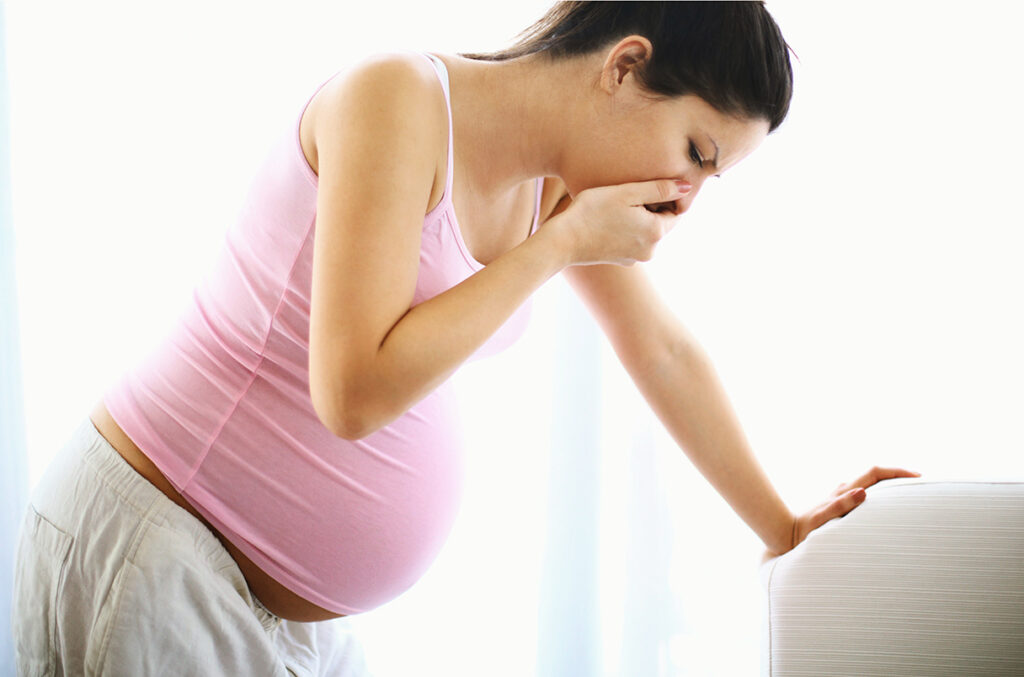E-mail: [email protected]

70% to 80% of women experience morning sickness during pregnancy. It’s totally harmless for your baby. A few lucky women don’t experience it, but most do during pregnancy.
On this page you will find:
What is Morning Sickness?
Morning sickness is nausea or vomiting during pregnancy. It’s the most common symptom of pregnancy. Despite its name, it can happen at any time of the day. For most women, morning sickness lasts until the 1st trimester of pregnancy, but a few women have morning sickness until delivery. Some women don’t get morning sickness at all. It varies from person to person.
When does Morning Sickness start?
Normally, morning sickness starts around the 6th to 8th week of pregnancy. Up to 70% to 80% of women get morning sickness in the first trimester. You can get morning sickness earlier, but it happens in a few cases. If you have morning sickness after the 10th or 11th week, you should consult with your doctor because it’s unusual in pregnancy. Remember that morning sickness doesn’t harm your baby.
When Does Morning Sickness End?
Normally, morning sickness ends after the 1st trimester of pregnancy, but in some cases, it lasts longer, even until delivery. Morning sickness has a different timeline for different women, so you can’t set a specific timeline for it.
If you have severe nausea or vomiting that you can’t tolerate, eat, or rest, consult with your health provider. Normally, it’s harmless, but sometimes it can cause problems.
Is It Normal if Morning Sickness Doesn’t Happen?
Yes, it’s normal if you don’t have morning sickness. Only a few lucky women don’t experience morning sickness. If you don’t get morning sickness, you are one of the lucky ones.
Symptoms of Morning Sickness
There are some symptoms of morning sickness in pregnancy:
Nausea
Nausea is a common pregnancy symptom. It especially happens in the morning, but nausea can occur at any time of the day. Some pregnant women face difficulties throughout their pregnancy journey. Most pregnant women experience nausea in the first trimester.
Sensitivity to Smells
Your sense of smell changes during pregnancy. Smell sensitivity is also a symptom of pregnancy. You may not be able to tolerate smells like cooking vegetables, fish, meat, or anything else that you liked before. These smells can cause uneasiness, nausea, or vomiting.
Vomiting
Vomiting is a common pregnancy symptom. It also especially happens in the morning, but vomiting can occur during the day or night. Some pregnant women can’t eat anything and vomit frequently. Most pregnant women experience vomiting in the first trimester. Some pregnant women face vomiting throughout their pregnancy journey.
Dislike of Certain Foods
You may develop a dislike for certain foods. For example, during my pregnancy, I did not like meat or poultry and also disliked spicy food. It’s very common for some pregnant women to develop a dislike for certain foods. It’s a natural issue and will usually resolve after the first trimester.
Exhaustion or Tiredness
Feeling tired or exhausted is very natural in pregnancy. Without any hard work, you may feel exhausted. It normally happens from the second trimester.
Anorexia
You may not feel like eating anything due to morning sickness.
What Causes Morning Sickness?
The exact cause of morning sickness is not fully understood. However, hormone changes and other factors are believed to contribute to morning sickness.
How to Manage Morning Sickness?
If you ask, “Can I manage my morning sickness?” The answer is yes, you can. You need to change your diet and lifestyle to make yourself feel better. Here are some tips:
When to Consult with a Doctor?
If nausea and vomiting make you uncomfortable and these signs become more severe, consult with a doctor. Other signs that warrant consulting your doctor include: